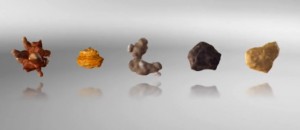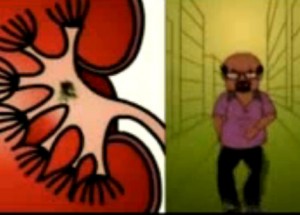Kidney stones refer to the development of hard, small deposits inside the kidneys. They consist of acid salts and minerals. There are many causes to the formation of kidney stones. One of the most common scenarios of kidney stones, result due to increased concentration of urine, that leads to the crystallization of minerals which causes them to stick together.
The passing of kidney stones through the urine can cause a lot of pain. Such pain generally tends to commence in the back or side, just beneath the ribs and then transfers to the groin and lower abdomen. The pain may undergo changes as the kidney stones move through the urinary tract.
There is no permanent damage due to the presence of kidney stones. Treatment for kidney stones is often not essential. One may only consume lots of water and intake painkillers to alleviate the pain. However, individuals with greater risk to develop repetitive episodes of kidney stones may opt for treatment to prevent instances in the future.
Symptoms of kidney stones
A kidney stone may not show any signs or symptoms until it has affected the ureter, which is a tube that connects the bladder and the kidneys. This may lead to the symptoms discussed below:
- Individuals may experience extreme pain in the side and back just below the ribs
- Urination may result in pain
- The pain may move to the groin or the lower abdomen
- The urine color may change to brown, red or pink
- There may be persistent and frequent urge to urinate
- Vomiting and/or nausea
- In case of secondary infection due to kidney stones, individuals may experience chills and fever
What causes kidney stones ?
Almost all kidney stones have crystals of varying types. The different types of kidney stones are listed below:
- Uric acid stones: Individuals who consume a diet high in protein, who constantly experience dehydration and those with gout are most likely to develop uric acid kidney stones. Some types of disorders in the blood-manufacturing tissues as well as some genetic variables may also predispose individuals to uric acid stones.
- Calcium stones: Most forms of kidney stones are calcium stones and generally tend to be in calcium oxalate form. The liver manufactures oxalate and certain vegetables and fruits as well as chocolate and nuts have high levels of oxalate. Additionally, excessive doses of vitamin D, various metabolic disorders, dietary variables and bypass surgery of the intestine can lead to an increase in the concentration of oxalate or calcium in the urine. Another form of calcium that may be found in urine is calcium phosphate
- Cystine stones: This is a rare type of kidney stones and tends to affect only a small percentage of the population who has a hereditary disorder that results in the production of increased quantities of certain amino acids by the kidneys
- Struvite stones: Such stones tend to grow rapidly and become very large. They generally result as a response to some sort of infection such as infection of the urinary tract.
- There are other types of kidney stones that can occur, but are very rare.
It is good to know the type of kidney stones, because it helps in the easy detection of the causes as well as in the prevention of future cases of kidney stones.
There are several factors that increase the risk to developing kidney stones. Some of them are as follows:
- A personal or family history of kidney stones
- Men are more likely to develop kidney stones than women
- An increased age of 40 or above
- Increased cases of dehydration
- Excessive body weight or obesity
- A high sugar, high sodium or high protein diet
- Presence or history of digestive diseases or gastric surgery
Treatment of kidney stones
Severe cases of kidney stones that result in the development of large stones may be treated in the following ways:
- The kidney stones may be removed with surgery through a procedure known as percutaneous nephrolithotomy
- The use of sound waves to break up the stones into tiny pieces which are passed out through urine. It is a painful procedure and may involve light sedation or anesthesia
- The doctor may also use a scope and special tools to detect and remove the kidney stones
- In case, kidney stones are caused due to excess production of calcium by the parathyroid glands, then they may be removed via surgery.
Kidney stones pictures


I am very eager to know how to flush out my kidney stones. As I had once made it wayback 2011 , until now am still taking Sambong tablet, alkaline water . I am afraid of surgery much more that I am not fluid enough to pay for the cost of the operation. The very reason am trying to know more natural methods and ways to pass out my kidney stones which are still in me. Thank you so much and I await your kind response .
Respectfully yours,
GRace